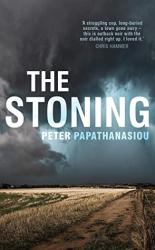In a conversation with a well known author of Australian Rural/Regional crime fiction on twitter recently, we talked about the differences between "rural noir" and "rural crime". She clarified the difference between rural crime fiction and rural noir fiction for me perfectly - a projection from the author about the place that they are writing. In noir you get the sense that the author feels this place is without hope, lost and struggling to find a future. In rural crime there's more of a sense of affection or hope for a setting, both of which often extends to the handling and depiction of characters.
All of which makes THE STONING one of the most pitch perfect examples of that rural noir definition that you're going to come across. There's something brutal and utterly bereft about the childhood hometown of central character DS George Manolis. Cobb is now a shadow of it's past, with loss of population and prospects, stacked up against community dysfunction and the tension - and what, upon reflection really feels like shame - that comes with being the host town for a detention centre. Sure "community leaders" might have seen the centre as an exciting purveyor of jobs and a future, but it's turned out to create an "us and them" scenario which a town with very few of "us" left can do without.
The crime at the centre of the novel is shocking enough - a local schoolteacher, tied to a tree and stoned to death. There's something very medieval about the crime, and this is all that's needed for some people to connect the dots with potential suspects in the detention centre. Nicely wrapping up the idea that the killer couldn't be a local and demonising a group of people that simply don't need further demonising. Helps that there's connections between the victim and the centre.
Stepping back into the town as the "big city cop", it takes a while for Manolis to process his personal connection to Cobb, understandable really when the local population seems to spend their entire lives obsessed with alcohol, fighting, prejudice and finding anybody else to blame for their plight. The dysfunction nicely reflected by local cops - a sergeant with a drinking problem; a bereaved female constable; and an indigenous, gay young constable who is bullied by just about everybody.
There are absolutely no punches pulled by the author in THE STONING. This is Australian rural noir at it's scathing, pointed absolute best. Uncomfortable reading, it was nonetheless absolutely riveting and it nailed everything about the environment, people, weather and desperation that makes up the subgenre. The sense of place is spot on, the characters utterly believable, the action unrelenting and the reality in your face, brutal and unapologetically so.
The Stoning

A small town in outback Australia wakes to a crime of medieval savagery.
A local schoolteacher is found taped to a tree and stoned to death. Suspicion instantly falls on the refugees at the new detention centre on Cobb's northern outskirts. Tensions are high, between whites and the local indigenous community, between immigrants and the townies.
Still mourning the recent death of his father, Detective Sergeant George Manolis returns to his childhood hometown to investigate. Within minutes of his arrival, it's clear that Cobb is not the same place he left. Once it thrived, but now it's a poor and derelict dusthole, with the local police chief it deserves. And as Manolis negotiates his new colleagues' antagonism, and the simmering anger of a community destroyed by alcohol and drugs, the ghosts of his past begin to flicker to life.
Add comment